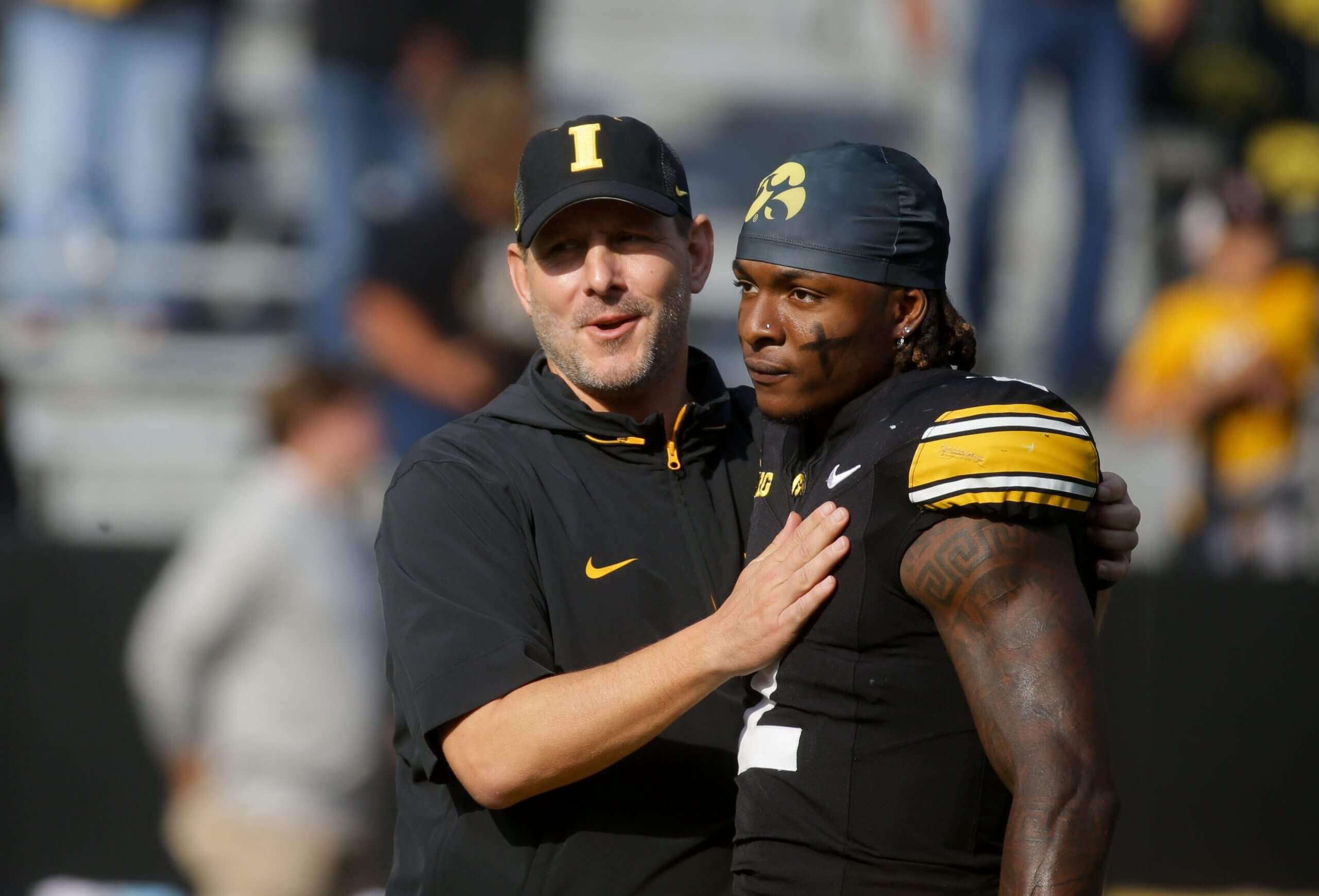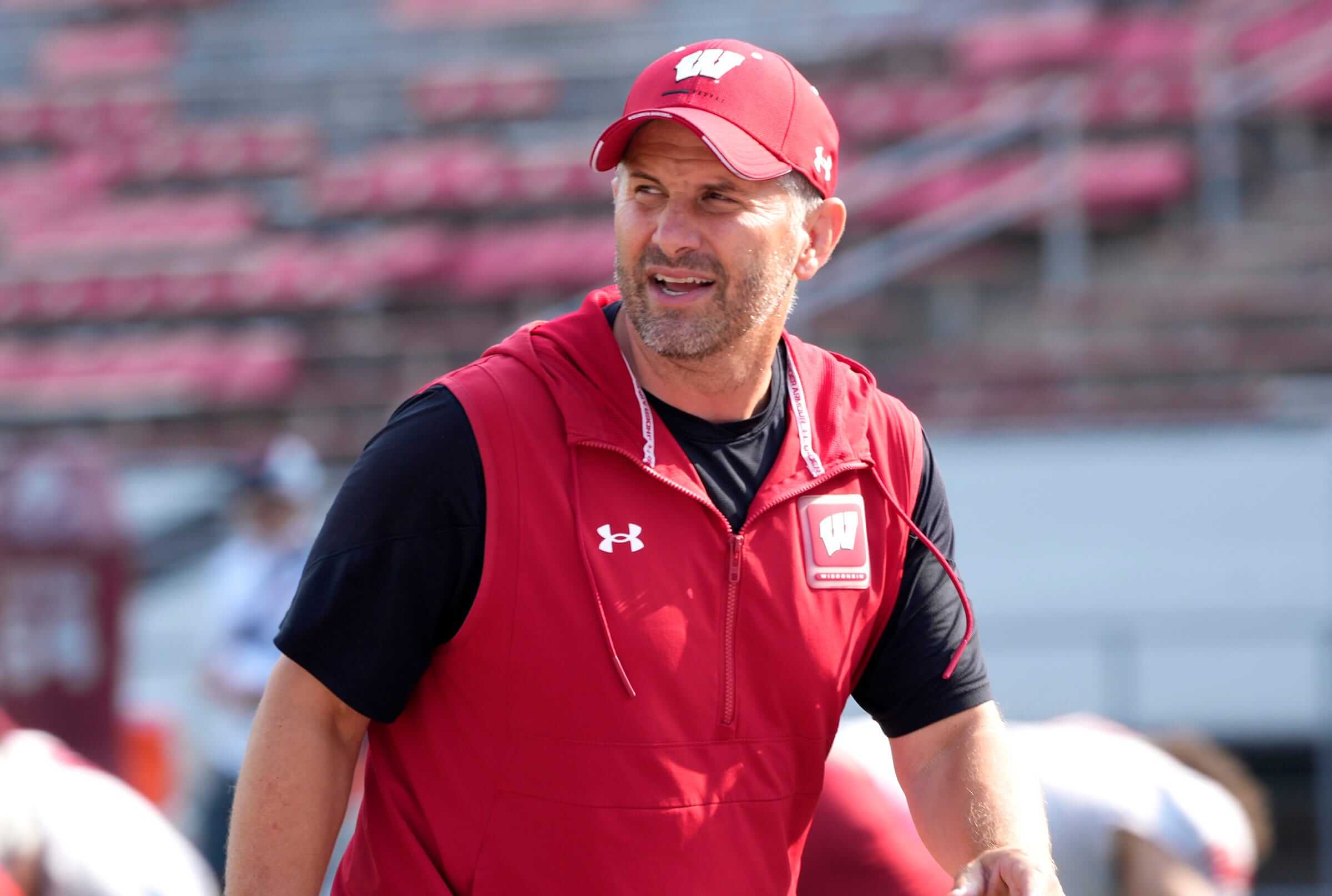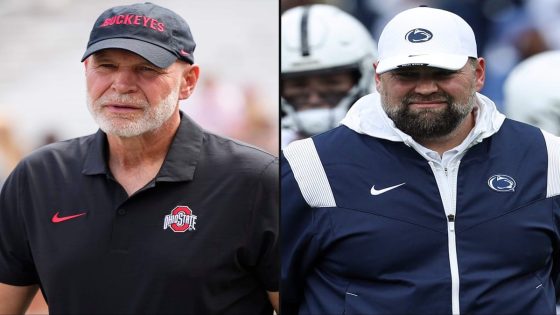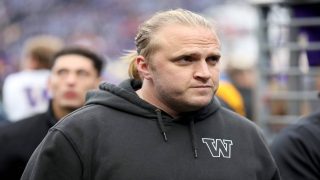The Big Ten entered the season with nine new offensive coordinators and eight new defensive coordinators sprinkled throughout the league. Since then, some have thrived, while others — Purdue OC Graham Harrell, Nebraska OC Marcus Satterfield and Wisconsin OC Phil Longo — have fizzled.
All season, The Athletic’s writers will rank various Big Ten topics. This week, Antonio Morales and Austin Meek list the conference coordinators who will define the final weeks of the college football season.
College Football Playoff contenders
Oregon: Will Stein, offensive coordinator
Stein is a strong play caller, and the Ducks offense is really good. It’s fringe top-25 in scoring and yards per play in the FBS. Oregon’s offense just doesn’t feel like the buzzsaw it has been the past two years, though. The running game hasn’t been as good. The Ducks are scoring touchdowns on 67.35 percent of their red zone trips, which is 40th nationally. They were eighth in that stat last season. When Oregon was rolling on offense the past two years, it felt impossible to stop. The Ducks rarely had 16-point games like they did Saturday at Wisconsin. Oregon has dynamic talent on offense, as it showed against Ohio State. It’ll be on Stein to get more of those performances out of the offense as tough challenges await in the conference title game and Playoff.
Ohio State: Jim Knowles, defensive coordinator
The Buckeyes’ defensive stats are great. They’re tied for first among all FBS programs in scoring defense (10.3 points), third in yards per rush allowed (2.79) and third in yards per play allowed (4.26). But in Ohio State’s biggest game to date — at Oregon — the defense faltered. The Buckeyes gave up 32 points, allowed 7.6 yards per play, surrendered 341 yards through the air and didn’t register a sack. The Buckeyes defense has been good in Knowles’ three seasons at the helm — and elite the past two years — but it has come up short in Ohio State’s biggest games: Michigan the past two seasons, the Playoff game against Georgia, and Oregon this season. Each of those teams scored at least 30 points. The Buckeyes face a high-powered Indiana offense this weekend, could see Oregon in the Big Ten title game and might run into some elite offenses in the Playoff. Knowles’ unit will have to be better on the big stage than it has been.
Indiana: Bryant Haines, defensive coordinator
Indiana’s high-octane offense gets a lot of attention, but the turnaround on defense has been equally impressive. The Hoosiers jumped from No. 87 in the FBS in total defense to No. 2 this season under Haines, who was Curt Cignetti’s defensive coordinator at James Madison. Indiana excels at creating disruptive plays and sacks and has a game-wrecker in JMU transfer Mikail Kamara, who leads the Big Ten with 9 1/2 sacks. The caveat is that Indiana hasn’t played a team ranked in the top 40 of the FBS in total offense, and four of its opponents rank No. 99 or worse. We’ll find out how the Hoosiers match up with one of the most talented offenses in the country when they play Ohio State on Saturday. These next six weeks will be huge for Haines, a Ball State alum and former graduate assistant at Ohio State.
Penn State: Andy Kotelnicki, offensive coordinator
Kotelnicki was hired to unlock Drew Allar’s potential and help Penn State’s offense get over the hump. The Nittany Lions have been more explosive this season, but they still need to prove they have the firepower to win a top-five matchup after the offense failed to find the end zone in a 20-13 loss to Ohio State earlier this month. At No. 4 in the CFP rankings, Penn State is in prime position to host a Playoff game as long as it can handle Minnesota and Maryland to end the regular season. The Athletic’s current projections have Penn State hosting Alabama, which would be a prime opportunity for Kotelnicki’s offense to make a statement.
Going bowling
Illinois: Barry Lunney Jr., offensive coordinator
Illinois might be the fifth-best team in the Big Ten, but the drop-off from No. 4 to No. 5 is significant. Outside of the losses at Penn State and Oregon, Illinois has been competitive with everyone on its schedule and has a chance to win nine games for the first time since 2007. The offense has been solid with Lunney calling the shots for quarterback Luke Altmyer, who has thrown 18 touchdowns and three interceptions. The numbers don’t look great — Illinois is No. 76 in the FBS in yards per play — but from a personnel standpoint, Lunney and head coach Bret Bielema have elevated Illinois into the top half of the Big Ten. If Illinois can beat Rutgers and Northwestern, the Illini could earn a date with the best of the SEC’s non-CFP teams in the Citrus Bowl.
Iowa: Tim Lester, offensive coordinator
The stats aren’t overwhelming. The Hawkeyes are 63rd nationally in yards per play (5.86) and 56th in scoring offense (29.1 points). But when you grade that on the Iowa offensive grading curve of the past two years, it feels like a top-10 offense. Lester has turned in a strong performance and unlocked running back Kaleb Johnson, who has been one of the best running backs in the country with 1,328 rushing yards and a school-record 21 touchdowns through 10 games. There’s been instability at quarterback because of injuries to Cade McNamara, Brendan Sullivan and others. Iowa is out of contention for the conference title but can build on its offensive progress over the final two games: at Maryland and against Nebraska. McNamara should return as the starter, which should help under center.

Minnesota: Corey Hetherman, defensive coordinator
Hetherman, the defensive coordinator at James Madison from 2019 to 2021, comes from the Cignetti coaching tree. He has proved to be a great hire for the Golden Gophers, who lost Joe Rossi to Michigan State after last season. Minnesota is No. 11 in the FBS in total defense and held USC, UCLA and Illinois to 17 points each during a four-game winning streak. Minnesota plays its biggest game of the season Saturday when Penn State comes to Minneapolis. The Gophers will try to turn that game into a low-scoring slugfest and throw up a roadblock on Penn State’s path to the CFP.
Washington: Steve Belichick, defensive coordinator
Washington is already bowl-eligible, which shouldn’t be overlooked as an achievement considering the massive turnover the program experienced on its roster and coaching staff. Jedd Fisch’s first year is a success. The Huskies defense has led the way, allowing just 4.80 yards per play, tied for 17th nationally. Belichick has done well in his first season in charge of the unit, but his toughest test comes next week when Washington faces an extremely talented Oregon offense. Belichick will have his hands full against the No. 1 team in the country in a rivalry that means a lot in the Pacific Northwest. Fisch’s first year should be viewed in a positive light, win or loss, against the Ducks, but losing to Washington State and Oregon in the same year would be a tough look.
Rutgers: Joe Harasymiak, defensive coordinator
Minnesota and Rutgers seem to be running a coaching exchange program. Hetherman coached linebackers at Rutgers under Harasymiak, who was Minnesota’s co-defensive coordinator in 2020 and 2021, and coached on Harasymiak’s staff at Maine from 2016 to 2018. Rutgers also has Minnesota’s former offensive coordinator, Kirk Ciarrocca, and former starting quarterback, Athan Kaliakmanis. The Rutgers defense has been one of the most disappointing units in the Big Ten this year; the Scarlet Knights rank 17th out of 18 teams in defensive yards per play. That’s largely why a Rutgers team with 10-win potential sits at 6-4. But getting to a bowl game is still a big deal at Rutgers, and the Scarlet Knights can finish with eight wins if they beat Illinois and Michigan State.
Best of the rest
Wisconsin: Mike Tressel, defensive coordinator
Wisconsin made a philosophical 180 by hiring Phil Longo, an Air Raid disciple, to run its offense. Luke Fickell pulled the plug after less than two seasons, firing Longo on Sunday after a 16-13 loss to Oregon. The Badgers are starting over on offense, but they can take some solace in the way their defense played against the No. 1 team in the nation. It’s been an up-and-down season for Tressel’s unit, which gave up 42 points to Alabama and Iowa but kept the Badgers competitive with Oregon and Penn State. Saturday’s game at Nebraska, a battle for bowl eligibility for both teams, will feature two offensive play callers who took over in November. That’s a pretty good indication of how this season has gone for Wisconsin and Nebraska.

USC: Lincoln Riley/Josh Henson, offensive coordinator
Henson has the coordinator title, but Riley calls the plays and it’s ultimately his offense. Some of the numbers might not suggest so, but USC’s defense has improved significantly this season. The Trojans are 42nd nationally in scoring defense (22.0) after ranking 121st (34.4) in the category last year. But the offense has been a letdown. For the first time in his head-coaching career, Riley doesn’t have a top-10 scoring offense. USC ranks 51st (30.3) in the category. For the Trojans to reach a bowl game, they’ll need more from their offense — which is still in the process of breaking in quarterback Jayden Maiava — against crosstown rival UCLA and Notre Dame, which has an elite defense. USC has to win one of those games to meet the six-win mark.
Nebraska: Dana Holgorsen, offensive coordinator
The Cornhuskers need to make a bowl game in the worst possible way — for the program and the fan base’s psyche. Nebraska’s postseason drought goes back to 2016, and after a 5-1 start this year, it looked like it would be a layup. The Cornhuskers have lost four consecutive games while trying to grab that elusive sixth win and haven’t scored 21 points in any of those defeats. Holgorsen took over play-calling duties last week, but the change resulted in just 20 points in a loss at USC. These next two games (versus Wisconsin and at Iowa) are an opportunity for bowl eligibility and for Holgorsen to establish chemistry with five-star freshman Dylan Raiola in the event the two are together at Nebraska next season. Getting a win and having those bowl practices would go a long way in that development as well. Putting Raiola in the most advantageous position to succeed should be one of the program’s chief priorities.
UCLA: Eric Bieniemy, offensive coordinator
The Bruins have played better of late to put themselves in a position to potentially reach a bowl by winning their last two games: against USC and Fresno State. But that doesn’t change the fact it’s been an ugly year offensively at UCLA, which ranks 107th in yards per play (5.26) and 123rd in scoring offense (18.8). The Bruins have scored more than 20 points in just two games this season. DeShaun Foster’s first year as UCLA’s head coach was always going to be tough. Given the Bruins’ 1-5 start to the season, Foster might have exceeded expectations by having them in this position. But for UCLA to make Year 1 of the Foster era an undeniable success, the offense will have to play its best two games to end the season.
Michigan: Kirk Campbell, offensive coordinator
This has been a disastrous season for Michigan’s offense. The Wolverines rank No. 129 in the FBS in total offense, one spot ahead of Northwestern, which comes to Michigan Stadium on Saturday. Don’t expect a lot of fireworks in that one. Realistically, Michigan needs to eke out a win against Northwestern to become bowl-eligible, avoid embarrassment at Ohio State and then start fixing an offense that’s been a liability all season. It’s unclear what that will mean for Campbell, who got the OC job on the strength of his work with J.J. McCarthy but hasn’t distinguished himself as a play caller. One way or another, Michigan needs to shake the Etch A Sketch on offense after this season.
(Top photos of Jim Knowles, Andy Kotelnicki: Adam Cairns / Columbus Dispatch / USA Today; Matthew O’Haren / Imagn Images)





